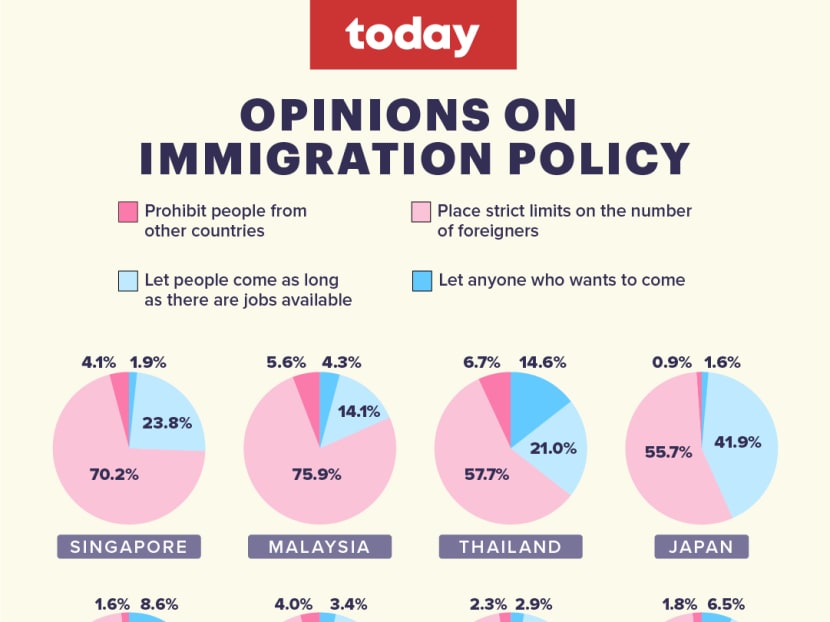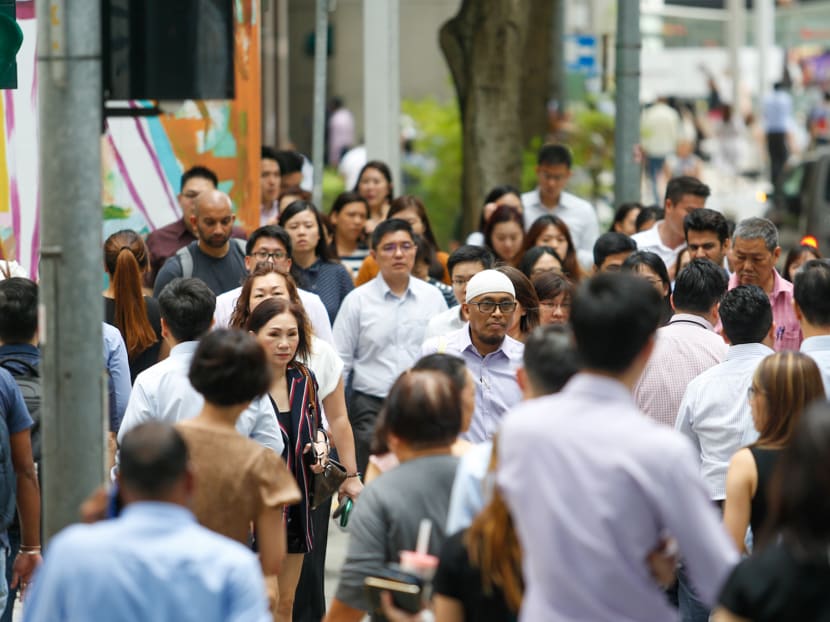IPS study finds most Singapore residents, especially older ones, want strict limits on inflow of foreigners
SINGAPORE — Most Singapore residents want strict limits on the number of foreigners entering the country and this view is more prevalent among those who are older.
- Over 2,000 Singapore residents were polled between November 2019 and March 2020 to find out their attitudes towards immigration
- Among the many findings, it also found that very few residents here were averse to having immigrants or foreign workers as their neighbours
- It found that younger and more educated respondents held more positive attitudes towards immigrants and foreigners
SINGAPORE — Most Singapore residents want strict limits on the number of foreigners entering the country and this view is more prevalent among those who are older.
This was among some of the findings in a study conducted by the Institute of Policy Studies (IPS), a National University of Singapore think-tank.
The study polled more than 2,000 Singapore residents between November 2019 and March 2020 to understand public attitudes towards immigration and its policies, including how they felt about the impact of immigration on Singapore’s job market, cultural diversity and social cohesion.
Among its many findings, it found that very few respondents were averse to having immigrants or foreign workers as their neighbours.
Overall, younger and more educated respondents held more positive attitudes towards immigrants and foreigners.
For younger respondents, this appeared to be consistent with their general tendency across the study to be more open to diversity and differences, the report said.
Naturalised citizens and permanent residents, unsurprisingly, had more positive views of immigrants and immigration.
Here is a more detailed look into the perceived impact of immigration and other findings.
Impact of immigrants on Singapore’s development
45.1 per cent of respondents were on the fence when asked whether immigrants positively or negatively impacted Singapore’s development
A higher proportion felt that immigrants had a “quite good” or “very good” impact, compared with those who felt that it was “quite bad” or “very bad”
Hence, the study said that the overall attitude towards immigrants among residents was either neutral or positive
The results here were most similar to the ones found in Sweden, Switzerland, Taiwan and the United States
Respondents from China were the most positive about immigration (52.2 per cent felt that the impact was “quite good” or “very good”)
More than 40 per cent of respondents from Malaysia, Thailand and Australia felt that immigrants had a “quite bad” or “very bad” impact on their country’s development
52.8 per cent of respondents with a university degree had a positive perception of immigrants
32.1 per cent of respondents who did not complete secondary school felt the same
Whether immigrants strengthen cultural diversity
48.4 per cent of respondents agreed that immigrants strengthened cultural diversity
This is smaller than the more than 65 per cent of respondents from Australia, China, Hong Kong, Taiwan and the US who thought so
More than 50 per cent of respondents aged below 51 agreed that immigrants strengthened cultural diversity
Slightly more than 40 per cent among people aged 51 and above agreed with the statement
Whether immigrants fill important job vacancies
51.1 per cent felt that immigration helps fill important job vacancies in Singapore
This was a lower percentage than those who felt the same way in China (54.2 per cent), Japan (55.9 per cent), Taiwan (75.1 per cent) and the US (57 per cent)
However, more Singaporeans agreed with the statement compared with Australians (47 per cent), Hongkongers (46.2 per cent), Malaysians (36.4 per cent), South Koreans (11.1 per cent) and Thais (37.7 per cent)
Younger respondents were more likely to feel that immigrants help fill job vacancies
60 per cent of those aged between 21 and 35 agreed with the statement
Only 42 per cent of those above 65 years old thought so
Whether immigration would lead to social conflict
37.8 per cent felt that immigration leads to social conflict
29.8 per cent felt that immigration would not lead to social conflict, while 32.4 per cent were undecided
This is similar to the Americans, Australians and Thais, with about 40 per cent of them thinking that immigration would lead to social conflict
Singaporeans were more likely to agree with the statement compared to the Chinese (20.6 per cent), Japanese (23.5 per cent) and South Koreans (12.7 per cent)
But they were less likely to feel that immigration would lead to social conflict compared to Hongkongers (69.8 per cent), Malaysians (60.8 per cent) and Taiwanese (62.7 per cent)
With the exception of those living in one- to three-room public housing units, the study found that those living in more expensive properties were more likely to feel that immigration would lead to social conflict
34.5 per cent of respondents living in four-room flats felt so, compared with 42.6 per cent of those living in private properties
Whether immigration increases unemployment
43.6 per cent of respondents said that immigration increases unemployment
This is lower than those who thought so in Hong Kong (52.9 per cent), Malaysia (55.7 per cent) and Taiwan (65 per cent)
In comparison, less than 30 per cent of respondents in Japan and South Korea agreed with the statement
Around 50 per cent of the respondents aged above 65 felt that immigration would increase unemployment
Only 38.4 per cent of those aged between 21 and 35 felt so
52.4 per cent of those who had Institute of Technical Education (ITE) or secondary school qualifications agreed with the statement, the highest among all age groups
Only 33.2 per cent of university graduates had the same sentiments
The study also found that respondents who had higher incomes and lived in larger housing types were more likely to disagree with the statement
More than 50 per cent of respondents in the lower-income categories (those earning less than S$1,500 and those earning between S$1,500 and S$2,999) were more likely to feel that immigration increases unemployment
Only 33.5 per cent of those earning above S$6,999 felt so
48.9 per cent of respondents living in one- to three-room public housing units were more likely to feel that immigrants increase unemployment
34.9 per cent of those who live in private property had the same perception
Whether immigration increases the risk of terrorism
26.7 per cent of respondents agreed that immigration increases the risks of terrrorism
32.5 per cent were undecided
This is similar to the results from China (17.8 per cent) and South Korea (25 per cent)
Female respondents (30.8 per cent) were more likely to think so compared with male respondents (23.2 per cent)
Younger respondents were more likely to disagree with the statement
50.2 per cent of those aged between 21 and 35 disagreed, compared with just 33.3 per cent of those aged above 65
The study said that there appears to be a more suspicious attitude towards immigration on the part of older respondents
More than 40 per cent of those with higher educational qualification tend to disagree with the statement, compared with about 37 per cent among those with ITE qualifications and below
Whether immigration increases the crime rate
29.7 per cent of respondents felt that immigration increases crime rate, while 36.9 per cent disagreed
Only 22 per cent of those aged between 21 and 35 agreed with the statement, compared with more than 30 per cent of each of the other age groups
Whether to have strict limits on the number of foreigners entering Singapore
70.2 per cent believe that the Government should place strict limits
More than 70 per cent of three of the older age groups felt that there should be strict limits, while 64.3 per cent of respondents aged between 21 and 35 believed in having them
A larger proportion of those in the younger age group (32.1 per cent) also felt that immigrants should be allowed to enter as long as there are jobs available, while less than 20 per cent of the two oldest age groups felt so
Whether to have immigrants as neighbours
Only 11.3 per cent of respondents mentioned immigrants and foreign workers when asked which groups of people they did not want as their neighbours
Compared to respondents from Japan, Malaysia, South Korea, Taiwan and Thailand, Singaporean respondents showed less aversion to immigrants or foreign workers as neighbours
Singapore’s results were similar to Australia, Hong Kong and the US










